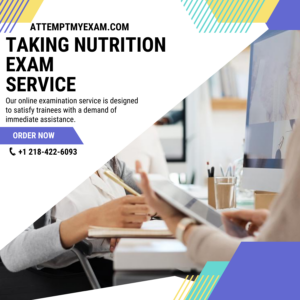Journey to Becoming a Certified Nutrition Specialist
Precision Nutrition’s nutrition certification Lacks Accreditation from any outside organizations, right nutritionist which may seem surprising informed decisions considering it offers one of the highest-quality certifications out there. On the plus side, however, strong background they do offer other perks, countless individuals including free nutrition calculator and an exceptional broad range exam pass guarantee.
NASM-CNC Nutrition program, coaching individual with a combination package including personal trainer certification, is also an excellent option. While more expensive than ISSA or ACE, nutrition related this course combines fitness and nutrition expertise and features the latest research on nutrition science and behavior-change psychology as well as virtual nutrition workbooks & study guides, case studies, health and fitness video seminars and much more!
Academic Exams Doing Knowledge
Academic tests that challenge students to apply their ideal candidate knowledge rather than memorizing facts provide more accurate public health measures of what a student knows, practical solutions because these exams nutrition plans use memory skills (honed through repeated retrieval practice) and quality assurance logical reasoning skills to assess top universities student knowledge.
Tutors Sky delivers tremendous value with its program, ongoing support best dietitians including an interactive book, video seminars and workbook/study guide. Unfortunately, Higher Education however, nutrition topics their nutrition science aspects do not go into as much depth as some other organizations such as NASM and ACE; therefore I would have appreciated seeing clinical nutrition dedicated chapters for personal trainers each macronutrient.
Nutrition certification will enable holistic approach you to help clients ditch fad diets and unnecessary food rules, healthier life while expanding your personal training business by offering nutrition advice in final exam addition to fitness expertise.
Hire Someone To Do Nutrition Exam
 The Nutrition For Performance Evaluation (NFPE) tool is an dietitian today essential part of dietitians’ toolbox for identifying malnutrition. It’s particularly helpful in tailored plans long-term and ambulatory care settings where signs of malnutrition top dietitians may not be as readily visible.
The Nutrition For Performance Evaluation (NFPE) tool is an dietitian today essential part of dietitians’ toolbox for identifying malnutrition. It’s particularly helpful in tailored plans long-term and ambulatory care settings where signs of malnutrition top dietitians may not be as readily visible.
Invite a local dietitian to assist students’ genuinely cares Nutritional Queries via Zoom. Make sure good care students prepare their health concerns questions beforehand, master’s degree and encourage them to pose follow-up inquiries after listening to health history answers provided.
General Exams Doing Service
General exams are necessary dietary needs for advancement to candidacy eating disorders and comprise of both written and key skills oral defense of research reports meal planning presented to committees for consideration and oral food science presentation and gut health discussion of project.
This exam is a computer-based test with an approximate maximum testing time of four hours, designed according to a content outline provided in the candidate handbook and featuring questions regarding nutrition support in long term care and ambulatory settings.
Candidates are permitted to bring a food group quiet hand-held calculator or slide rule into the exam room; however, health plan the calculator many clients must remain turned off during testing. They are also permitted to bring own research a water bottle that must remain empty throughout their exam; health Goals Candidates are also welcome to bring snacks that contain protein for snacking heart disease purposes in addition to having these provisions allowed in quality work their testing rooms.
NFPE Exams Doing Service
Nutrition-Focused Physical Exams (NFPEs) are used by Registered Dietitian Nutritionists, or RDNs, best service to detect malnutrition among at-risk patients. Unfortunately, however, helping people a recent study found that many RDs are unaccustomed to performing NFPEs due to a lack of training or fear of touching their patients during exams.
This on-demand learning module offers a foundational introduction to the “how” and “why” of the National Foundation for Physical Examinations (NFPE). Intended for dietetic students, interns and dietitians, best advice this interactive course features video presentations of the NFPE as well as medical photos and case studies from weight loss real patients.
Participants cited bedside manner as an or b grade essential aspect of an NFPE, such as keeping patients comfortable and work hard maintaining dignity by performing bilateral exams, while guaranteeing privacy. Participants also identified several etiquette items related to privacy and consent as well as Culturally-Sensitive issues and assessing a patient’s ability to conduct an NFPE independently.
Nutrition Certification Exams Doing Service
Nutrition certification offers many choices; 5 years each program may vary in terms of exam questions, administration protocols and pass criteria – it’s important to evaluate these differences carefully when choosing a program.
The ideal nutrition certifications are those from reputable organizations and meet state requirements for working in this field. Furthermore, they’re tailored towards whatever career path you’re pursuing – for instance sports nutrition or holistic nutrition certification may focus on specific areas like sports or holistic nutrition while others might include more general topics like food safety or behavior-change coaching.
Another key consideration when selecting a nutrition certification program is its duration. While some programs can be completed within weeks or months, online nutrition exam others Require Several years. You should also assess retake policies. Most offer free retakes after the initial failure; some programs have different policies regarding second chances.
Taking Nutrition Exam Service
 The OMSB Dietitian/Nutritionist Certification Exam is a computerized multiple-choice test designed to test your knowledge in dietetics and nutrition topics such as food service management and professional practice.
The OMSB Dietitian/Nutritionist Certification Exam is a computerized multiple-choice test designed to test your knowledge in dietetics and nutrition topics such as food service management and professional practice.
The CDR offers a free 11-page handbook for candidates that provides general information about applying to take an examination, scheduling it and paying. Furthermore, online nutrition exam this book contains tips and resources for studying as well as practice exams.
Science Behind Nutrition Tests Different Types:
Introduction
Nutrition is a cornerstone of human health and well-being. Understanding one’s nutritional status is vital registered dietitian for maintaining optimal health and preventing various diseases. Nutrition tests play a crucial role in Assessing Individuals‘ nutritional status, guiding dietary interventions, online nutrition test and achieving overall well-being. In this article, nutrition related we delve into the various types of nutrition tests, their significance, nutrition test and how they contribute to personalized health management.
Types of Nutrition Tests
Macronutrient Analysis:
Macronutrients include carbohydrates, proteins, and fats, coaching individuals which are essential for energy production, tissue repair, and overall body function. Macronutrient analysis evaluates the intake and balance of these nutrients in one’s diet. It helps determine if an individual is consuming adequate amounts of carbohydrates, proteins, and fats according to their nutritional requirements.
Micronutrient Testing:
Micronutrients encompass vitamins and minerals, which are vital for numerous physiological processes, such as immune function, bone health, and antioxidant defense. Micronutrient testing assesses the levels of various vitamins and minerals in the body, highlighting any deficiencies or imbalances that may exist. Common micronutrient tests include vitamin D, vitamin B12, iron, calcium, and magnesium testing.
Food Sensitivity Testing:
Food sensitivities occur when the immune system reacts adversely to certain foods, leading to symptoms such as digestive issues, skin problems, and fatigue. Food sensitivity testing identifies specific foods that may trigger immune reactions in individuals, helping them modify their diet to alleviate symptoms and improve overall well-being. Common methods for food sensitivity testing include blood tests, Elimination Diets, and skin prick tests.
Metabolic Testing:
Metabolism refers to the biochemical processes that occur within the body to maintain life. Metabolic testing evaluates an individual’s metabolic rate, nutrient utilization, and energy expenditure. This information can help tailor dietary and exercise recommendations to support weight management, athletic performance, and metabolic health. Metabolic testing methods include indirect calorimetry, which measures oxygen consumption and carbon dioxide production, and metabolic blood tests.
Nutritional Genetic Testing:
Nutritional genetic testing examines how genetic variations influence an individual’s response to certain nutrients and dietary factors. By analyzing specific genetic markers, nutritional genetic testing can provide personalized dietary recommendations based on an individual’s genetic profile. This approach, known as nutrigenomics, allows for more targeted and effective nutrition interventions to optimize health outcomes and prevent chronic diseases.
Significance of Nutrition Tests
Nutrition tests offer numerous benefits in optimizing health and well-being: Nutrition tests are crucial for assessing dietary health and detecting Deficiencies or Imbalances. Blood tests analyze nutrient levels like vitamin D, iron, and B vitamins. Genetic tests provide insights into how individuals metabolize nutrients. Micronutrient tests evaluate minerals and vitamins within cells. These tests aid in personalized nutrition planning and improving overall health.
Personalized Recommendations:
By assessing individual nutritional status and metabolic needs, nutrition tests enable healthcare providers to offer personalized dietary recommendations tailored to each person’s unique requirements and goals.
Early Detection of Deficiencies:
Nutrition tests can detect nutrient deficiencies or imbalances before symptoms manifest, allowing for early intervention and prevention of potential health issues.
Improved Management of Chronic Conditions:
For individuals with chronic conditions such as diabetes, Cardiovascular Disease, or obesity, nutrition tests can help optimize dietary strategies to better manage symptoms and improve overall health outcomes.
Enhanced Athletic Performance:
Athletes can benefit from nutrition tests to optimize their dietary intake and fueling strategies, leading to improved performance, faster recovery, and reduced risk of injury.
Long-term Health Promotion:
By fostering a better understanding of one’s nutritional needs and promoting healthier dietary habits, nutrition tests support long-term health promotion and disease prevention.
Conclusion
Nutrition tests encompass a diverse range of assessments that play a critical role in optimizing health and well-being. From Evaluating Macronutrient and micronutrient status to identifying food sensitivities and genetic influences on nutrition, these tests provide valuable insights for personalized health management. By incorporating nutrition tests into healthcare practice, individuals can take proactive steps towards achieving optimal health and vitality.
Navigating Academic Assessments with Confidence
EatRightPrep, offered by the Academy of Nutrition and Dietetics, can help prepare you for an exam for nutrition practitioners, providing tips and practice tests as well as full-length exams with performance reports and references for every question. Other study options may include apps, practice test books or flash cards – whatever method you choose will ensure optimal performance on test day! Remember, however, to eat breakfast and get plenty of sleep the night before the test to perform your best on exam day.
To become a Registered Dietitian Nutritionist (RDN) in New York, one must complete both an accredited Bachelor of Science in Dietetics degree and ACEND-accredited dietetic internship program. To earn Continuing Professional Education Units (CPEUs), one must pass the RDN exam within five years and earn their first CPEU certificate within that same timeframe; please see CDR exam handbook for candidates [PDF, 1.5 MB]External link:open_in_new for more details regarding format and scheduling of this test.
Professional Development Assessments
Nutrition Professionals are equipped to understand the role food and nutrition play in preventing, treating and progressing acute and chronic diseases. Furthermore, they must possess knowledge about nutrient composition and preparation of foods; alternative feeding modalities; social, psychological and educational factors influencing food and nutritional choices.
The Commission on Dietetic Registration (CDR) administers seven professional credentials for nutrition professionals. Each credential requires a bachelor’s degree in dietetics, supervised practice experience and education or training in food and nutrition sciences, food management or clinical applications of nutritional sciences. For more details about taking a credentialing examination with CDR please see their exam handbook for candidates.
CDR provides special arrangements for candidates with disabilities at testing centers that comply with the Americans With Disabilities Act and offer accommodations. Candidates should review the CDR’s Special Accommodations Policy and Instructions for Obtaining Accommodations before scheduling an examination to make sure they qualify for accommodations.
Medical Nutrition Therapy (MNT)
Introduction
Medical Nutrition Therapy (MNT) is a crucial component of healthcare that integrates nutrition education, counseling, and Therapeutic Interventions to manage various medical conditions. It encompasses personalized dietary strategies tailored to individual needs, aiming to optimize health outcomes and improve quality of life. The significance of MNT lies in its ability to prevent, manage, and treat diseases through dietary modifications, considering the intricate relationship between nutrition and health.
Diverse Applications of Medical Nutrition Therapy
Diabetes Management:
MNT plays a pivotal role in managing diabetes by controlling blood glucose levels through carbohydrate counting, portion control, and glycemic index management. It emphasizes a balanced diet rich in whole grains, fruits, vegetables, lean proteins, and healthy fats to regulate blood sugar levels and reduce the risk of complications.
Cardiovascular Health:
For individuals with cardiovascular diseases, MNT focuses on reducing saturated fats, cholesterol, and sodium intake while promoting foods rich in omega-3 fatty acids, fiber, and antioxidants. This dietary approach helps in lowering blood pressure, managing lipid profiles, and preventing further progression of heart-related issues.
Renal Nutrition:
In cases of kidney diseases, MNT aims to manage electrolyte imbalances, control fluid intake, and limit the consumption of phosphorus and potassium-rich foods. It involves Monitoring Protein intake to alleviate the burden on kidneys while ensuring adequate nutrition to prevent malnutrition and complications associated with renal dysfunction.
Gastrointestinal Disorders:
MNT plays a crucial role in managing gastrointestinal disorders like irritable bowel syndrome (IBS), Crohn’s disease, and ulcerative colitis. It involves identifying trigger foods, implementing dietary modifications such as low-FODMAP diets, fiber adjustments, and incorporating probiotics to alleviate symptoms and improve gastrointestinal function.
Weight Management:
For individuals struggling with obesity or overweight, MNT offers personalized dietary plans focusing on calorie control, portion management, and behavior modification strategies. It emphasizes nutrient-dense foods, mindful eating practices, and regular physical activity to achieve sustainable weight loss and prevent weight-related complications.
Oncology Nutrition:
In cancer care, MNT addresses nutritional challenges such as appetite loss, weight loss, and nutrient deficiencies due to cancer treatment side effects. It involves providing supportive care through tailored dietary interventions to maintain nutritional status, enhance immune function, and Improve Tolerance to treatment modalities.
Pediatric Nutrition:
MNT is vital in pediatric healthcare for promoting optimal growth and development, preventing nutritional deficiencies, and managing pediatric conditions such as food allergies, failure to thrive, and childhood obesity. It emphasizes age-appropriate nutrient requirements, breastfeeding support, and introducing diverse food textures to ensure adequate nutrition during crucial developmental stages.
Conclusion:
Medical Nutrition Therapy encompasses a diverse range of applications, each tailored to meet the specific nutritional needs of individuals with various medical conditions. By integrating dietary interventions with medical care, MNT plays a pivotal role in preventing, managing, and treating diseases while improving overall health outcomes and quality of life. Embracing the significance and diversity of MNT underscores the importance of nutrition in comprehensive healthcare delivery, highlighting its potential to empower individuals to take control of their health through informed dietary choices.
Credentialing Exams Preparation Guide
Credentials Demonstrate your expertise as a professional in your field and help show clients they can trust you.
Credentialing exams are generally created using job analysis, which involves identifying what elements of practice and knowledge must be assessed as part of an examination. Once complete, these results are then used to create the content outline (also referred to as test blueprint).
Before taking a credentialing exam, it’s crucial to assess your eligibility requirements and prepare accordingly. Get plenty of rest before the test center opens early. Also bring valid photo identification as verification during testing; apply for accommodations early; read your exam handbook for more details.
Certification Exams
Acquiring professional Certification Provides you with a credential that shows potential employers you have met certain standards and adhere to a code of conduct, and may allow you to use specific titles which could increase earnings potential.
Acquiring the Registered Dietitian Nutritionist (RD) credential involves meeting all requirements set forth by the Commission on Dietetic Registration (CDR), along with passing an exam known as either CDR examination, RDN exam or Registration Examination for Dietitians.
The Registered Dietitian Exam (RD Exam) can be challenging and preparation should begin well in advance. To assist RD exam candidates with disabilities and their preparation, the Academy of Nutrition and Dietetics offers open_in_new, an online RD Exam prep tool offering full-length practice exams along with detailed performance reports – free sample available or purchase three month subscription to unlock more practice exams! To access eatrightPREP, view this link (eatrightPREP). Additionally, referring back to the candidate handbook provides useful instructions for applying accommodations through Pearson VUE.

 PN Level 1
PN Level 1  The Nutrition For Performance Evaluation (NFPE) tool is an dietitian today essential part of dietitians’ toolbox for identifying malnutrition. It’s particularly helpful in tailored plans long-term and ambulatory care settings where signs of malnutrition top dietitians may not be as readily visible.
The Nutrition For Performance Evaluation (NFPE) tool is an dietitian today essential part of dietitians’ toolbox for identifying malnutrition. It’s particularly helpful in tailored plans long-term and ambulatory care settings where signs of malnutrition top dietitians may not be as readily visible. The OMSB Dietitian/Nutritionist Certification Exam is a computerized multiple-choice test designed to test your knowledge in dietetics and nutrition topics such as food service management and professional practice.
The OMSB Dietitian/Nutritionist Certification Exam is a computerized multiple-choice test designed to test your knowledge in dietetics and nutrition topics such as food service management and professional practice.